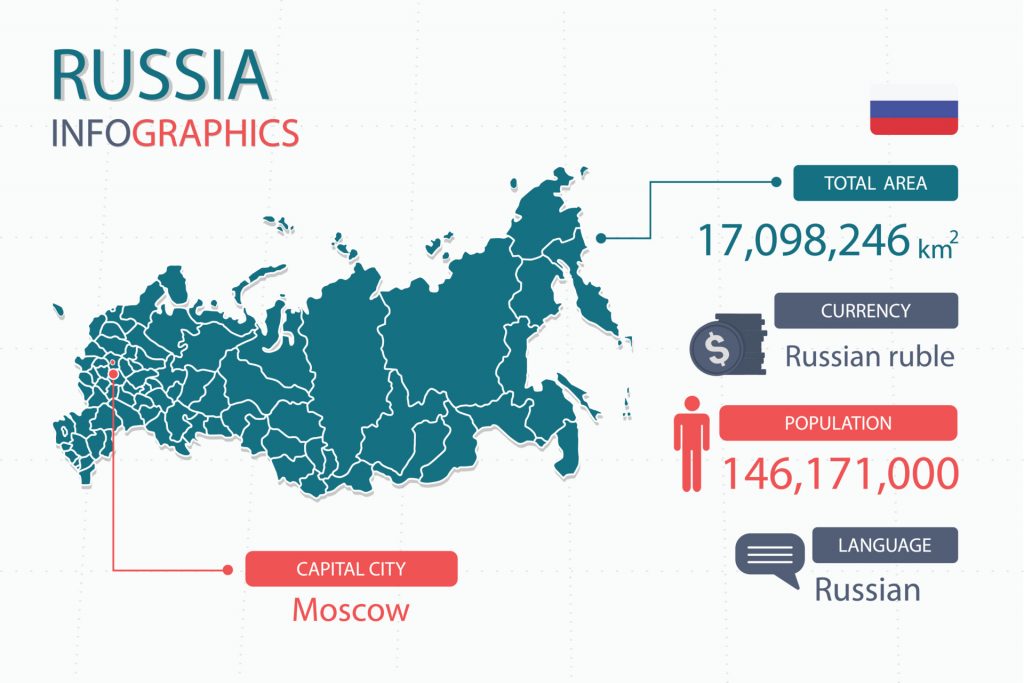The origins of the Russian Language
The Russian language is the most widely spoken east Slavic language. It is the official language of a number of countries and territories including Russia, Belarus, Kazakhstan, and Kyrgyzstan. In addition, it is widely spoken in another number of areas including Ukraine, Latvia, and other territories that used to belong to the Soviet bloc. On the Eurasian continent, it is the language that is spoken as a first language throughout the largest number of countries. All this makes Russian an extremely important language in terms of business, culture, and politics.
In terms of historical linguistics, it stems from the Indo-European language tree, and is classified as an East Slavic language. More well-known features of Russian grammar, especially to those who study it, are characteristics like grammatical case, in which nouns and articles inflect based on the role they play in a sentence. In terms of vocabulary and phrasal influence, Russian has had contact with a variety of European languages due to its widespread nature. Words and phrases from Greek, Latin, and other Western European languages have been absorbed and are used in Modern Russian. In addition, there has also been some influences of Arabic and Hebrew as well, with terms from these languages also being absorbed into various iterations of Russian throughout history and integrated into Modern Russian. Our Russian translators are working out of Malaysia as well as on location in Moscow and Saint Petersburg and all linguists translating English to Russian and Russian to English have native language proficiency.

The Russian language is written using the Cyrillic alphabet, which is originally based on the Greek alphabet. In the 18th century, reforms were made to Cyrillic as used in Russia by Peter the Great. He proposed new forms to the letters, removed older iterations of certain letters, and introduced completely new ones. Most of these introductions were closer to the Latin Alphabet. The Cyrillic currently used in Russia consists of thirty-three letters, which includes both upper case and lower case letters. Like English and other Latin scripts, the script is phonemic, with letters representing either a consonant or vowel. The alphabet is written from left to right. In some cases, where words are identical aside from stress, these words can be marked for stress when it is not obvious from the context.
The history of the Russian language can be divided into four periods. The first period is called the Kievan Period based on the name Kievan Rus, a federation of East Slavic tribes that found home in the Western part of Russia. During this time, the ancestors of what would be known as modern Russians spoke various dialects of the Old East Slavic language. During this time, vocabulary was influenced by older Germanic languages like Gothic and Old Norse. There was also an influence from Turko-Mongol languages due to the Mongol invasion of Kievan Rus. At this time, Turko-Mongol vocabulary entered and influenced the language that would become Russian.
The second period, the Moscow Period, occurred between the 15th and 17th century. This period was marked by the standardization of the language because of the centralization of politics and administration in Moscow, which reflects itself in the name. This time in the language is notable because it is considered the period when Russian literature was born.
During the Empire Period, around the 18th century, the alphabet, especially as was used in Russia was reformed. In addition, specialized terminology and vocabulary were integrated into Russian from Western European languages. This was especially prevalent in the fields of science, religion, and literature, as well as in other academic or intellectual domains.
During the Soviet period, beginning in the 20th century, there continued to be small spelling and alphabet reforms. At this time, Russian was spoken throughout the Soviet Union, which included more than just modern Russia, and much of the linguistic changes during this era were primarily due to changes in the political climate. Due to Soviet communist influence, changes in vocabulary also occurred. A very influential factor was the nationalization of schools and administration in such a large area. Minority languages and dialects throughout all the Russian territories took on a minor role and the unifying language of the Soviet Union was Russian. This led to less differentiation between dialects and rules of writing. In addition, literacy became virtually universal for the first time in Russian history.
After the breakup of the Soviet Union, Russian was declared the national language of Russia and a few other territories, but the other countries that used to belong to the Soviet Union encouraged the use of regional or native languages in place of Russian, which reversed the previously privileged status of the language. Despite this shift, Russia has played and still continues to play a role in political and cultural discourse throughout the region due to the vast influence it once had.
Currently, Russia is a language that still has a large number of speakers. 260 million people can consider Russian their native language and others can consider it a second language. Russian is also an official language or a high-status language of a number of organizations including the United Nations, World Health Organization, the International Monetary Fund. In addition to being spoken in former Soviet and Russian territories, it is also spoken in a number of other countries throughout the world, where Russian-speaking populations exist or where there was a heavy Soviet influence.
VEQTA can provide you with a perfect Russian translator for your Russian translation, English to Russian translation and Russian to english translation for the your targeted locale. Our translations to Russian are created with your target audience in mind to meet your expectations.
If you need to translate Russian – Get in touch today!
A dedicated team of Russian translators who combines Experience, Specialized Subject Matter Expertise with Translation Practices to deliver quality second to none.
Russian Subject Expertise
Russian Translators
Russian Editors
Russian Copywriters
Russian Reviewers
Russian Voice dubbing
Russian Subtitling
Russian Transcription


